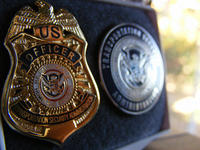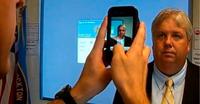-
Biometric passports rapidly becoming the norm
A new report indicates that biometric passports will soon become ubiquitous around the world; within the next five years, 90 percent of passports will contain integrated smart card IC chips that will hold the carrier’s biometric data
-
-
Fingerprint biometrics help secure medical data at Arizona hospitals
As more healthcare networks begin storing patient records electronically, they have become increasingly concerned with security and many are turning to biometrics; a healthcare provider in Southern Arizona recently introduced fingerprint biometrics at its facilities to help secure patient records and increase efficiency
-
-
Businesses customizing ads with facial biometrics
In a futuristic turn, some advertisers have already begun customizing their digital ads to whoever passes by using facial recognition software; so far the Venetian resort in Las Vegas, Nevada has been the first to adopt this technology in the United States; the resort has installed cameras with facial recognition technologies near their digital displays to customize restaurant and entertainment suggestions for individuals passing by
-
-
DHS report: gap in TSA badging process poses threats

A new government report revealed that the Transportation Security Administration (TSA) is unable to accurately account for its employees who have access to secure areas in airports, resulting in a significant security gap
-
-
Mississippi schools consider fingerprint scanners
A school district in Mississippi is considering installing biometric fingerprint scanners at its cafeterias to identify students; Tupelo School District officials are currently debating a proposal to use biometrics instead of the existing system which relies on student ID numbers for meals; one official argues that the new system would make lines flow more quickly and ultimately contribute to increased student performance
-
-
Aware wins TSA contract for employee fingerprint scanners
Aware Inc. recently won a contract to supply the Transportation Security Administration (TSA) with biometric fingerprint scanners to help the agency conduct employee background checks
-
-
Senator Schumer targets fake IDs from China
Fake IDs have long been a problem for law enforcement agencies, but the recent discovery of counterfeit IDs from China that appear nearly identical to the real thing have lawmakers particularly concerned
-
-
Oklahoma woman battles against REAL ID
An Oklahoma woman has sparked a federal controversy after she refused to renew her driver’s license; in February Beach was pulled over by law enforcement officials in Norman, Oklahoma and ticketed for driving with an expired license and she is now fighting that ticket as part of a larger campaign against REAL ID
-
-
U.K. airports install biometric passport readers
Individuals with biometric passports from the United Kingdom or the European Union will now be able to use sophisticated automated e-Passport scanners at every major U.K. airport
-
-
Safran completes L-1 acquisition, becomes world’s biometric leader
In the latest series of purchases by traditional defense firms seeking to diversify their portfolios, French defense company Safran recently completed its $1 billion acquisition of biometric solution provider L-1 Identity Solutions making it the world’s market leader in biometrics
-
-
Portable biometric system for police officers

Police now have a new low-cost, portable biometric tool in their arsenal to quickly and accurately identify a suspect: an Apple iPhone; using MORIS (Mobile Offender Recognition and Information System), an app developed by BI2 Technologies, police officers can now use an Apple iPhone to scan a suspect’s fingerprint or snap a photo of their face to scan their iris
-
-
Growing problem in Canada: stolen passports
On average, 1,000 Canadian passports are stolen across Canada every month; in FY2009-10, 13,077 passports were stolen in Canada; by comparison, only 631 were swiped overseas; another 47,704 passports were reported lost in Canada; late next year, Passport Canada will begin distributing e-Passports to the general public
-
-
Law enforcement and privacy concerns in Vancouver
Last month, the police in the otherwise sedate Vancouver had to use tear gas, pepper spray, and flash bombs in downtown Vancouver to try to disperse angry rioters who set cars on fire, looted stores, and taunted police officers after the Canucks’ 4-0 Stanley Cup final loss to the Boston Bruins; the police wants to use facial recognition technology to identify the rioters, but privacy advocates are worried
-
-
Law enforcement and privacy concerns in Massachusetts
Massachusetts has a plan: create a database which could map drivers’ whereabouts with police cruiser-mounted scanners that capture thousands of license plates per hour — and store that information indefinitely so local police, state police, federal agencies, and prosecutors could access it as they choose; privacy advocates are worried
-
-
U.S. troops deploy biometrics in the field
Biometric databases in Iraq and Afghanistan are helping U.S. troops combat violent insurgents; in an ambitious move, troops have sought to capture iris scans, facial photographs, and fingerprints from men of fighting age especially those who have been detained for insurgent or terrorist ties.
-
- All
- Regional
- Water
- Biometrics
- Borders/Immig
- Business
- Cybersecurity
- Detection
- Disasters
- Government
- Infrastructure
- International
- Public health
- Public Safety
- Communication interoperabillity
- Emergency services
- Emergency medical services
- Fire
- First response
- IEDs
- Law Enforcement
- Law Enforcement Technology
- Military technology
- Nonlethal weapons
- Nuclear weapons
- Personal protection equipment
- Police
- Notification /alert systems
- Situational awareness
- Weapons systems
- Sci-Tech
- Sector Reports
- Surveillance
- Transportation
Advertising & Marketing: advertise@newswirepubs.com
Editorial: editor@newswirepubs.com
General: info@newswirepubs.com
2010-2011 © News Wire Publications, LLC News Wire Publications, LLC
220 Old Country Road | Suite 200 | Mineola | New York | 11501
Permissions and Policies
Editorial: editor@newswirepubs.com
General: info@newswirepubs.com
2010-2011 © News Wire Publications, LLC News Wire Publications, LLC
220 Old Country Road | Suite 200 | Mineola | New York | 11501
Permissions and Policies
